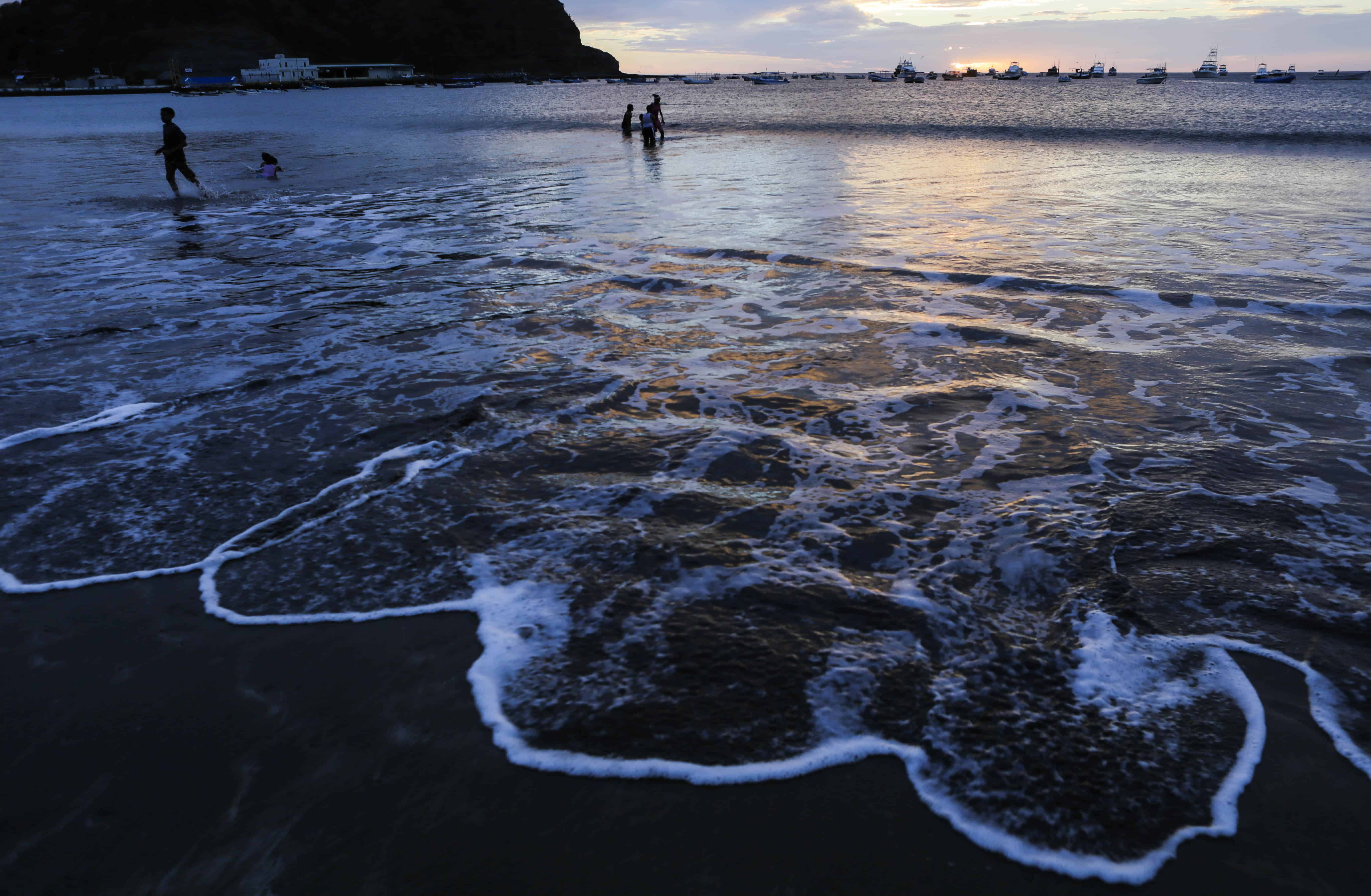See also in our Tico Times Travel section: 7 can’t-miss reasons to visit Granada, Nicaragua
SAN JUAN DEL SUR, Nicaragua – It was quite easy to spot the rebbetzin, or the rabbi’s wife, within my first few minutes of a hot February afternoon in the Nicaraguan beach town of San Juan del Sur. Looking as if she belonged more in Brooklyn, with her modest, long dress and pushing a baby in a carriage, she bought a fruit juice in a definitively New York-accented Spanish, making her stand out even more among the throngs of scantily-clad tourists and surfers. But I of course knew there is a rabbi and his family in this small town along the Pacific Ocean, and that was one of my reasons for visiting.
Yet here at this tiny outpost of Judaism, a part of the worldwide Chabad Lubavitcher outreach movement, Israelis and other Jews are made to feel welcomed and at home. That is true even though a huge statue of Jesus Christ towers above the town reminding all that Nicaragua, like other Spanish-speaking countries, is an overwhelmingly Catholic nation. A food cart just up the street from the Chabad House sports a sign saying “Cristo Vive” further adding to the contrast.
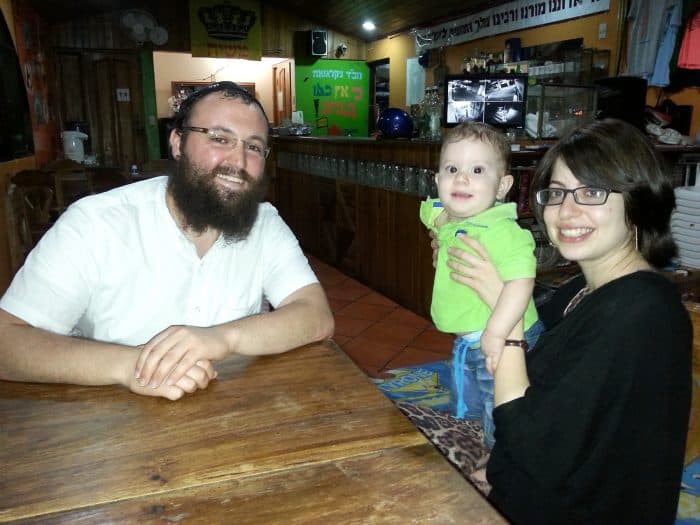
Making a home
The Rebbetzin Chana Atar and her husband, Rabbi David Atar, have not been in Nicaragua for long but have already made their presence known in this once-sleepy town, especially because among the many travelers who flock to the surfer’s paradise are throngs of young Israelis. They, along with a few local Jewish residents, volunteers and tourists, are attracted to the Chabad Center for traditional Jewish food, to speak in Hebrew, celebrate Shabbat and holidays and maybe to get a dose of some religious and liturgical sustenance.
The U.S.-born Chana Atar grew up in Israel, while David, an Israeli who studied in France and New York, always wanted to be a shaliach, or rabbi-emissary. They are now making a home for themselves and their 8-month old son, Levy Itzhak, just enjoyed their second wedding anniversary, and opened an already popular kosher falafel shop on the beachfront this past February. They are making plans to build a mikvah, or ritual bathhouse, for cleansing. Of course for now, the lovely bay and beach of San Juan del Sur – just steps from the front door of the Chabad Center – will have to do.
The ground floor holds the shtiebel, or religious sanctuary, and the second floor serves as the busy kitchen, dining room and living room of the corner building. Chaim Sand, 23, sat back and relaxed among the chairs and couches overlooking the ocean.
“It’s like my house. No, it is my house,” said the handsome, kippah-wearing, Canadian-born Israeli. He was joined by Moishe Dansker, a rabbinical student from Buenos Aires who was working closely with Rabbi and Rebbetzin Atar.
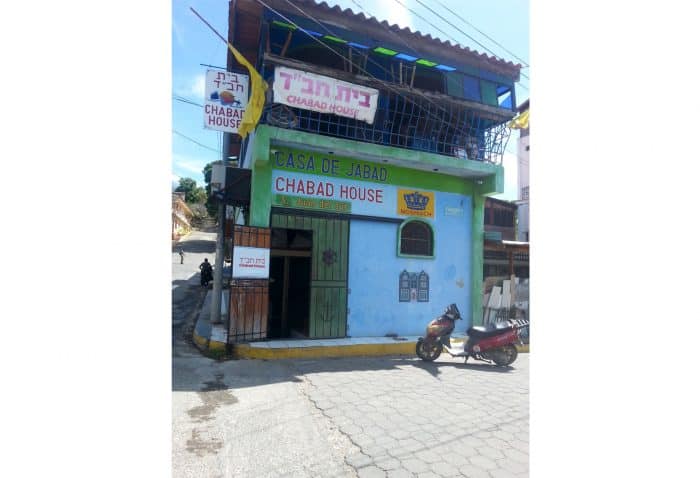
Far-flung corners
The Atars, of course, do what most Chabad shaliachs are known to do: They bring a Jewish presence focused on worship, holidays, religious observance and teaching to both major cities and the far-flung corners of the world, such as San Juan del Sur. A two-hour drive from the capital city of Managua and just a short ride to the Costa Rican border, it seems like an unlikely spot even for Chabad, until one sees how many Israelis are passing through.
Atar also trained to become a shochet, or ritual slaughterer, so he could prepare kosher chicken, and he even does catering for Jews visiting Managua who request kosher food. But one of his strangest requests for help involved a decidedly un-kosher animal. Late one night, a young woman was stung by a scorpion in a nearby hostel. The first thing she and her hostel friends did was to wake up the rabbi who drove her to a nearby clinic for medical treatment. “You accept anyone and you help them,” said Atar, a Hebrew-speaker who is conversant – though not fluent – in English and has had to learn Spanish. He recalled dealing with what he only described as a “burial assignment” and had to call to friends in Israel to handle the delicate situation.
“This place is a center for any Jewish person who needs anything. He or she can get it here. A non-Jewish girl who was beaten was brought here because they knew it would be safe for her,” said the rabbi.
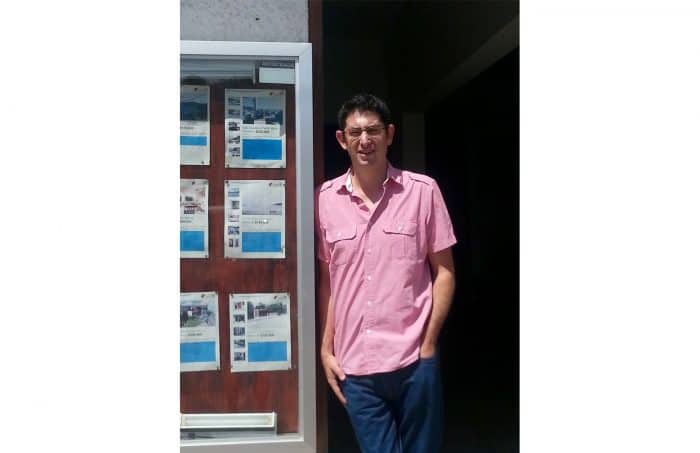
Festive meals
On a sweltering Friday afternoon, a long table was set as a huge meal was being prepared in the tiny kitchen. The sun was starting to sink over the bay making the view one of the nicest Sabbath settings for any Chabad center.
As evening descended quickly – as it does in the tropics – a boisterous crowd of young Israeli backpackers, sprinkled with a couple of U.S. travelers and a Canadian family, arrived to welcome the Sabbath. Along with the blessings, the ritual hand washing, the wine and some superb, fluffy, home-baked challah (bread) came a sumptuous meal of a variety of vegetables, grains and salads, and of course libations, toasts, more wine and singing accompanied by table thumping. Rabbi Atar delivered a talk in Hebrew, and the visiting Canadian woman spoke in English of her local volunteer efforts. The Israelis, almost all in their 20s, talked among themselves, paying no mind or heed to the few English speakers enjoying the Shabbat, self-separated as they were by language and apparently by age.
The next morning, the parashah, or Torah portion, was about Moses receiving the Ten Commandments to give to the children of Israel. Thanks to Rabbi and Ms. Atar and Chabad, it was possible for those gathered to obey the commandment to remember the Sabbath and keep it holy. Later that evening, a crowd of 25 again enjoyed another festive meal. After havdalah (the end of the Sabbath), many wandered over to the beachfront food stall Chabad just opened. The Middle-Eastern staple falafel was new to some, yet quite familiar to many of the mostly youthful, surfer crowd who lined up to get fresh and kosher pita-filled treats for as little as $4 each.
Among the frequent local visitors to Chabad are Zach Lunin and his family. The Newton, Massachusetts native operates a thriving real estate concern, in no part due to North Americans who are attracted to Nicaragua. He came by way of the University of Maryland, Prague, and then Boston, before moving to León in the northern region of Nicaragua, and then to San Juan del Sur, in 2004. Lunin finds Chabad to be a welcoming place where he can introduce his small children to Jewish tradition, music, prayer and food.
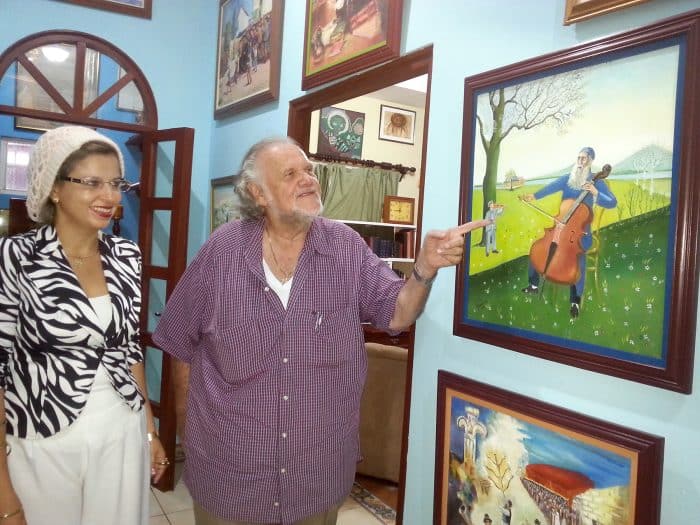
Signs of Jewish life
While Chabad, a worldwide Chassidic movement, is making its presence known in San Juan del Sur, there was probably a Jewish presence in Nicaragua – as elsewhere in the Caribbean and Latin America – dating back to the Spanish Inquisition and early days of exploration, although little is known. Some European Jews arrived in the 19th century, mainly centered in Managua, but it wasn’t until the 20th century that their numbers had grown enough to establish a communal presence and synagogue. Because they were generally of the professional or business class, many left when the Sandinistas came to power, although some rose to prominence in the Sandinista regime and government, including Herty Lewites (1939-2006), the late popular mayor of Managua. He went on to challenge Daniel Ortega for the presidency, and there is some speculation that the Sandinistas may have assassinated him. There is also mention of another earlier Jewish mayor named A. Raczkiewsky.
Jewish gravestones can be found in Managua, the town of Masaya, and in the former colonial capital and now thriving tourist town of Granada, where there is a Jewish section in the large cemetery with Magen Davids (Jewish stars) adorning walls and gravestones.
But there are also signs of Jewish life in Granada, mostly centered around the home and hotel resort of La Fortaleza, owned and operated by Kurt Preiss and his wife, Veronica, a native Nicaraguan. Preiss, who could pass for a Jewish Burl Ives or Santa Claus, was born in Colombia to German immigrants in 1946. His father, a leather merchant, moved the family to Honduras in 1947 and exported kosher meat to the Yishuv, the Jewish community in Palestine-Israel. Preiss received a Jewish education and an AA in agricultural engineering, and came to Nicaragua in 1967 where he operated a leather processing and manufacturing company. He operates a leather goods store in Granada.
He and his Nicaraguan wife, Veronica, host Jewish guests, organize Sabbath dinners and holiday receptions from La Fortaleza Granada, the resort villa they own just outside of Granada. Fortaleza has a pool, restaurant and 12 apartments. Their garden displays sculptures with Jewish themes such as a Magen David and Menorah. Inside is a virtual museum of Jewish art and family memorabilia ranging from painting to photographs, documents, seder plates, books and ornaments. Preiss plans to expand the lodging with 34 single rooms and is contemplating bringing Jewish tour groups to Nicaragua.
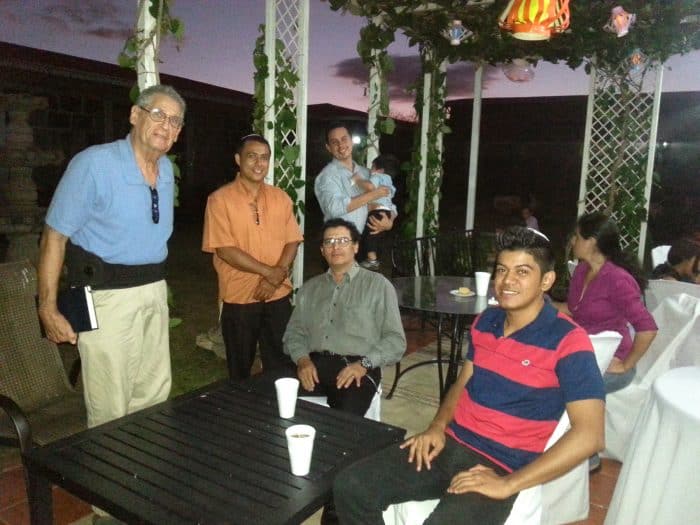
A stone’s throw from the central park of Granada, Israeli couple Yasmin and David Tzafar operate what is apparently becoming one of the town’s hottest restaurant spots. David had dreams of a restaurant in Israel but said “it’s expensive and complicated,” so through family connections he found his way to Granada and opened Pita Pita. They’ve been serving Mediterranean food and pizza since June 2014 in their restaurant that is now ranked No. 3 out of 112 restaurants reviewed by customers on the website TripAdvisor.
Even with its beautiful and peaceful courtyard with lush vegetation, the Tzafars have found that operating a Nicaraguan restaurant has its own set of complications and expenses. David said that finding the right ingredients is “super complicated,” and lamented that a kilo (2.2. pounds) of garbanzo beans that cost a dollar in Israel costs him $4 a pound in Nicaragua. But his hummus and falafel have won praise.
“I find that most Nicas actually love Israel and Israelis and Jewish people and get emotional when they meet us,” said Tzafar.
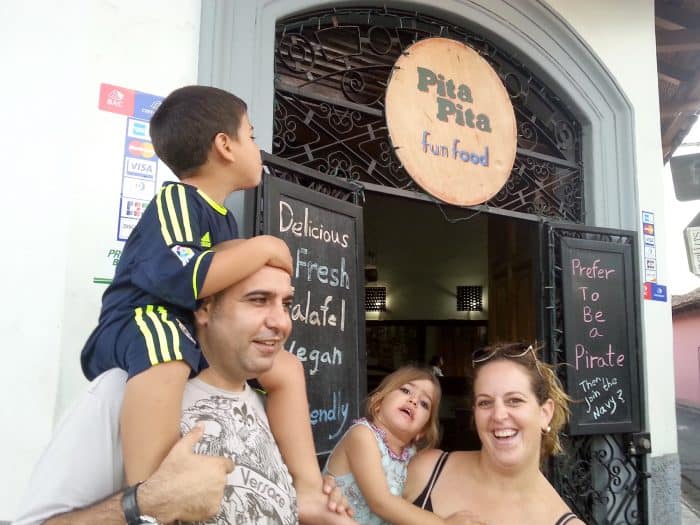
While enjoying a snack with her two small children, Yasmin said, “By definition, we’re not religious. I grew up with a lot of culture around the Jewish holidays, Israeli poets and this is an obvious thing to me,” adding that “almost every day Israelis come through.” She has introduced Jewish holiday celebrations and culture at the school her children attend.
Jewish visitors and residents may increase as tourism continues to develop and as more Canadians and travelers from the U.S. flock to the increasingly popular and – for now at least – relatively peaceful and inexpensive tropical destination.
For further reading, click here and here.
See also: Costa Rican Jews brave hazards, homesickness and Hamas to pursue new lives in Israel

